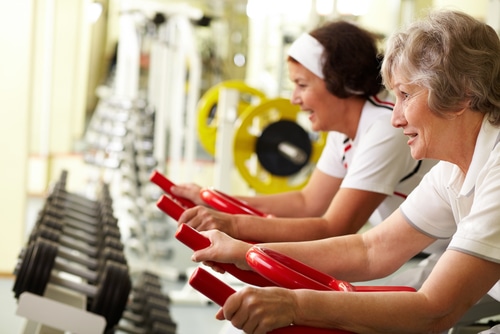
Exercise and Aging: Exercise Reduces the Risk of Disability
According to one study, two factors increase the risk of disability – eating a poor diet and lack of exercise. In this study, a lack of exercise increased the risk of disability by a whopping 76%! How does exercise keep you mobile and active as you age? Resistance training helps to preserve strength and muscle mass. Just as importantly, it builds functional strength, the ability to do tasks like carry a bag of groceries up the stairs or do housework. High-impact exercise and resistance training help preserve bone mass too. Fractures due to osteoporosis can keep you from enjoying an active lifestyle.
In addition, exercise improves flexibility and balance. This reduces the risk of falling. Broken hips are one of the most common causes of disability and early death in older people. How does staying flexible help with aging? As we grow older, ligaments shorten and joints become stiffer. This makes it harder to get around without pain. Exercise keeps joints and the synovial fluid inside them in motion so they’re less likely to stiffen from underuse. Plus building strong muscles through resistance training helps to stabilize joints so they experience less wear and tear.
Exercise also lowers the risk for chronic diseases like heart disease, type 2 diabetes, obesity and cancer that are linked with a shorter lifespan and a greater risk for being disabled.
Staying Physically Active Increases Longevity
Once you’ve retired, you want lots of years to enjoy yourself. Exercise not only decreases the risk of disability, but it could also keep you around longer. A large study sponsored by the National Institute of Health showed exercising adults can expect to enjoy as many as 4.5 additional years of life. In this study, even low levels of physical activity modestly extended life. This was true for both men and women. More years to enjoy and less risk of disability. That’s certainly motivation to work up a sweat.
Exercise Preserves Memory and Cognitive Function
It’s not going to be a very productive retirement if your mind is failing and your memory’s not what it used to be. In one study, researchers found blood flow increased to parts of the brain associated with memory when a group of participants 57 and older began an aerobic exercise program. Other research shows exercise releases a chemical called BDNF (brain-derived neurotrophic factor) that helps your brain form new connections. It also helps to prevent atrophy or loss of brain tissue due to aging. All in all, exercise is one of the best things you can do to keep your brain healthy as the year’s pass.
Exercise Improves Mental Health
A number of studies show exercise eases anxiety and depression. Depression is common among older people and ongoing depression can keep you from enjoying your retirement years. One study published in the Annals of Internal Medicine and reviewed in the Duke Chronicle showed exercise was as effective for treating symptoms of depression in the elderly as anti-depressant medications.
There are several reasons why exercise is a mood elevator. It stimulates the release of feel-good chemicals called endorphins that cause a temporary elevation in mood. It also seems to impact neurotransmitters like serotonin that are reduced in people who are depressed. Plus, exercising gives a sense of accomplishment. How do you feel after a workout? Chances are you feel pretty good that you did it! Exercise gives you a sense of accomplishment and helps to build positive self-esteem – all good things!
The Bottom Line?
Now you know four good reasons why exercise is essential for healthy aging. Not only does physical activity improve your body composition and help you look better, but it can also keep you active during your retirement years. It’s never too late to start. No matter your age you can enjoy the health benefits that exercise offers.
References:
Science Daily. “Aerobic Exercise Improves Memory, Brain Function, Physical Fitness”
Neuroscience. 2005;133(3):853-61.
Med Sci Sports Exerc. 2012 Dec;44(12):2362-8.
Technogym. “Poor diet and lack of exercise could lead to increased disability risk, says study”
Social Indicators Research
August 2013, Volume 113, Issue 1, pp 307-318
Bloomberg Personal Finance. “Taking Up Exercise at Retirement Triples Healthy Aging”
National Cancer Institute. “NIH study finds leisure-time physical activity extends life expectancy as much as 4.5 years”
The Duke Chronicle. “Study finds that regular exercise can aid elderly depressed patients”
Related Articles By Cathe:
Can You Still Get the Benefits of Exercise if You Start Later in Life?
New Evidence Shows that Exercise Slows the Aging Process – and in an Unexpected Way
Can Strength Training Lower Your Risk of Dying Prematurely?

